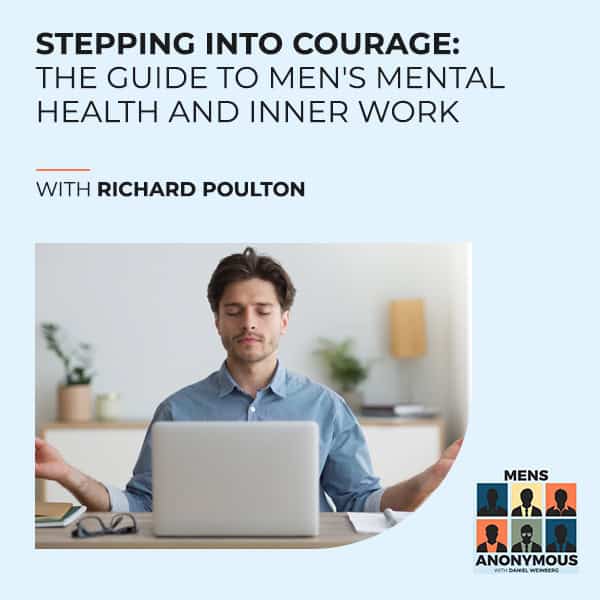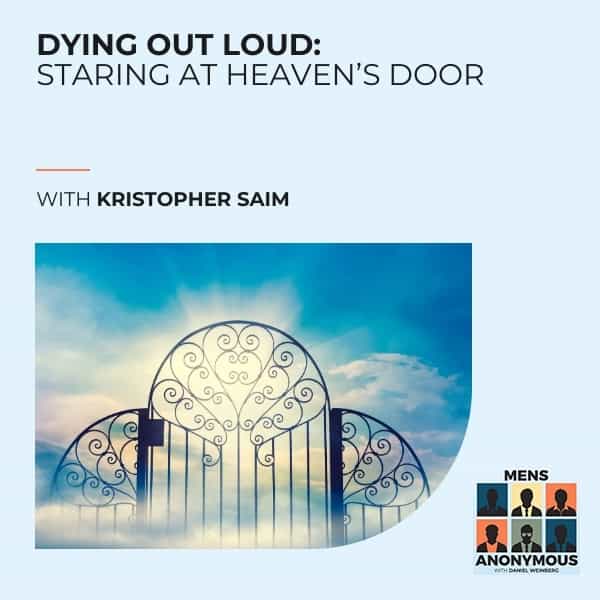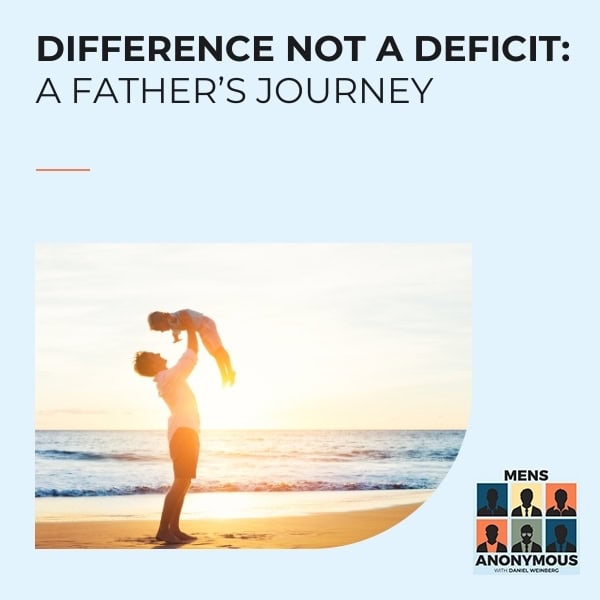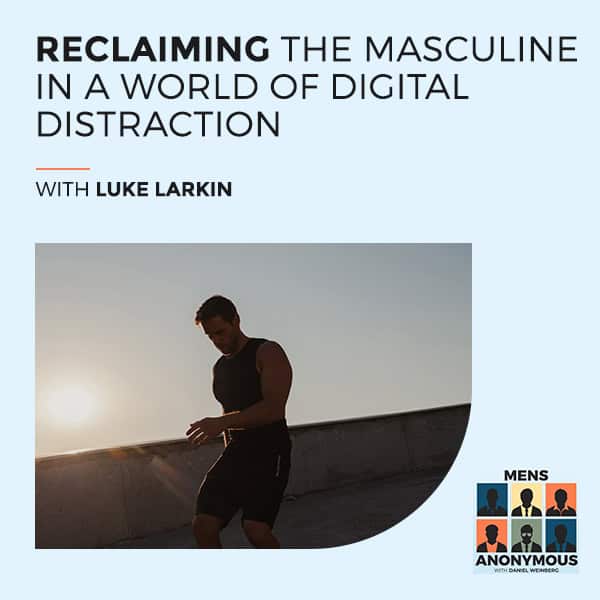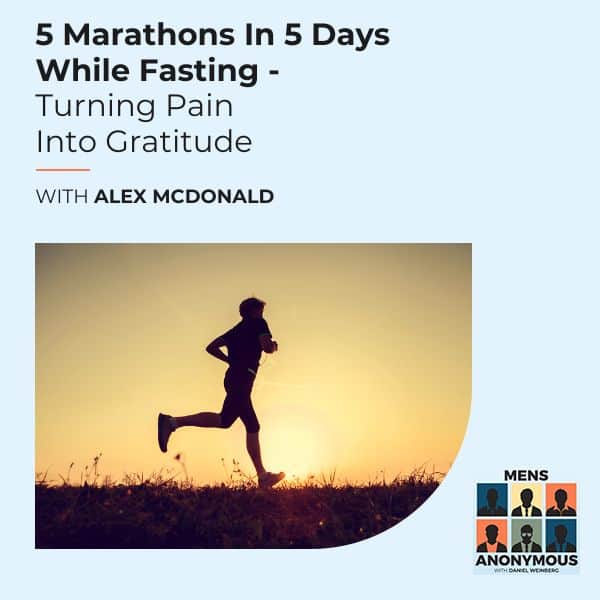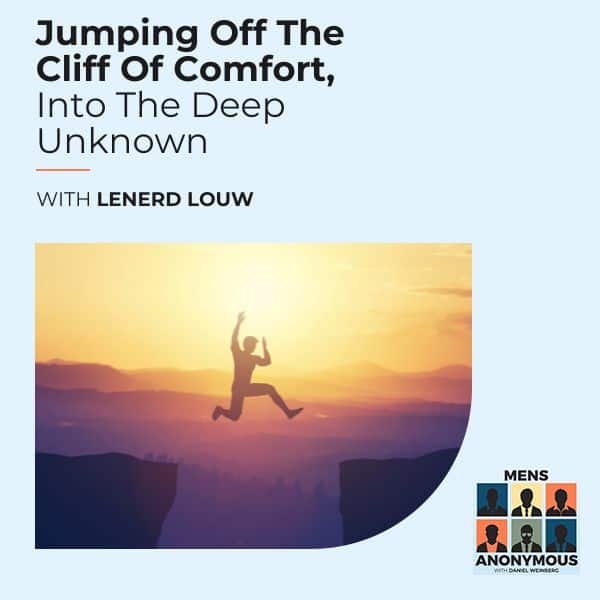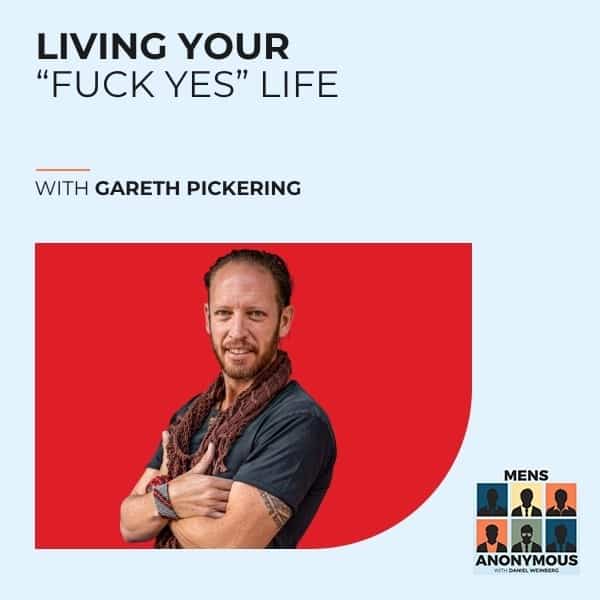
Navigating men’s mental health and overcoming anxiety is a challenging journey, often shrouded in silence and suppression, but Richard Poulton, a global advocate in this space, breaks through that barrier with his powerful personal narrative. In this episode, we dive deep with Richard, a former Asia Pacific CEO and founder of Step Into Courage, as he shares his raw and honest story of battling anxiety, PTSD, and the pressures of success. From his working-class upbringing in London to leading a successful business in Asia Pacific, Richard’s journey is a testament to resilience and the transformative power of vulnerability. He discusses the coping mechanisms that masked his struggles, the pivotal moment of his diagnosis, and the life-changing impact of meditation. Join us as Richard reveals the importance of inner work, finding your tribe, and stepping into courage to break free from the stigma surrounding men’s mental health.
—
Watch the episode here
Listen to the podcast here
Stepping Into Courage: Richard Poulton’s Guide To Men’s Mental Health And Inner Work
Richie, welcome to the show.
From London Roots To Global Advocate: Richard Poulton’s Early Life & Ambition
Thanks for having me.
Good to see you. It’s been a while.
You too.
I think what we’ll do is I’d like to talk to you about your journey to becoming a global advocate in the men’s mental health space. You’ve got your own personal journey, which I think is interesting. I think the readers will get a lot out of what you’ve been through and how you’ve managed to overcome many of the issues, particularly around anxiety. Why don’t we kick off with a little bit of background? We met in Australia quite some years ago, but you’re from the UK originally. Tell us how you got to Australia.

We did met in Australia from London originally. We’re up in London, very working class family. My mom was a travel agent, my father was a painter and decorator. I grew up in a council house with my parents. My parents got divorced when I was probably nine or ten, if I remember. My sister moved out. She was four years older than me. She moved out when she was sixteen. She got pregnant quite young. I live with my mom. Just me and my mom lived in this house, grew up there. My mom moved away, and I ended up going to live with my dad. Just a little bit of not having a secure place, if that makes sense.
You’re moving around a lot.
I also had some difficult things happen to me at a quite young age, which I didn’t address until I got a lot older. Believe it or not, I studied drama for three years. I think this was just a way I could escape the anxiety that I had. I was wearing a mask, I think, for a lot of that time. Going with my magic tricks, I’ve become a glass collector at a local social club. Very social, loves being around people, wanted to be the centre of attention, but didn’t do very well at school because of this.
My school grades were pretty poor. I pretty much failed my GCSEs. I went to drama school for three years. I ended up in Cyprus, in a little beach town called Ayia Napa, and I was an MC in nightclubs. My first real entrepreneurial business was a nightclub called Shagwells. It was all based on Austin Powers. A dancing mini me midget, which you probably couldn’t get away with nowadays, but it was just fun. I did that for a few years. I realized I needed to get a real job. I trained to be a stockbroker in the UK. I did my FCA exams from home.
Difficult because academically I didn’t do very well at school, as I said. I managed to pass my FCA’s after three times, and I got a job for a financial company selling AFEX in 2004. Spent eighteen months doing that. I got head hunted by a company in the same space, a company called AFEX. After six months, they offered me a New York, Los Angeles, or Sydney to start a business. I flew to Sydney in ‘05, and that’s when I started becoming the Asia Pacific managing director of that company and grew out Asia.
The Catalyst Moment: Unmasking Anxiety & Personal Challenges
What an incredible story. from a working-class, broken home. You didn’t get it through doing well at Oxford or Cambridge or something like that and then end up becoming the CEO of a very successful financial services business. Tell me what that point or catalyst was, because I recall you’re around 36 years old, and you faced some both personal and business challenges in your life that ended up exposing what you were masking or suppressing from your youth. What happened?
I’ve always had anxiety from a very young age.
How does that present itself in you?
As a kid, I was OCD. Checking the taps, checking the back doors closed, intrusive thoughts. My mom took me to the doctors when I was young because of the thoughts and my behavior.
When you say thoughts, what do you mean?
Just intrusive thoughts like worried about your mom, something’s going to happen to your mom, your mom’s going to die. If you don’t do this, this will happen. Checking the taps, checking the back door. Just things around safety and security. I was very nervous.
Anxiety and fear.
The doctor said, “Don’t worry. He’s just got an over-imaginative mind.” That just shows you how, in them days, there was no real support system. Typically, now you would have therapy or you would get some help. Anxiety was always there, and I just suppressed it, whether it was by having a couple of beers a night. My coping mechanisms are being social, being with people, and not being alone. I did that for a very long time.
As I said, I moved to Australia, and anxiety was always there, but I blocked it out, and I never really did any self-work or inner work. I got to 36 and, just through my business, my best man in my wedding and my three groomsmen, they worked with me. I brought a few of them over from London to start working with me in Sydney. Unfortunately, I was living in LA for a year, and while I was there, they set up a company behind my back.
Which worked against you.
I respect him, but it still impacted me. Took it personally, rightly or wrongly. Did have an impact on me. I don’t have any bad feelings towards them now. At the time, it was very traumatic. I lost all my friends. Lost my best man and my three groomsmen were working at, so they’d gone. We went to the Supreme Court. During that time, I was getting migraines a lot. I was not being present. I ended up getting shingles, and like at 36 years old, my doctor’s like, “You shouldn’t be getting shingles at 36.”
That’s a nervous system situation.
It’s like you have chickenpox for adults. It’s something you get very late in that.
It’s a type of herpes virus.
Luckily, I just had a little rash. Didn’t have it near my eyes or anything, but it’s something you get when you’re a little older. He just said, “Are you stressed?” I’m like, “I don’t feel stressed.” What I realized was that at this point, I needed some support. My executive coach said, “You’re living in your nervous system. You need to get healthy.” I think I was just in denial, thinking, “I’m fine. Nothing’s wrong with me.” After the shingles, I really took a step back, and I was burnt out, and I just said, “I need to understand what’s going on.” My first real act of courage was to see a GP, and the GP said, “Let’s do these little anxiety tests.” He’d come back and said, “You’ve got PTSD and generalized anxiety disorder, which is quite common.”
Diagnosed With PTSD & Anxiety: Seeking Support & Treatment
Can you stop there, for example, an anxiety test. How does one get tested for anxiety? What do they do?
You can do it online, but obviously, do it through your GP. They just ask you like ten questions. I think that’s for a call. It was a long time ago now. Questions like, “Do you ever have negative thoughts? Do you have trouble sleeping? Do you feel like having impending doom?” These are just things that would point to the fact that you may struggle with anxiety.
What were your symptoms, for example?
Just consistently overthinking.
Constant chatter in your head.
Yeah. We have 85,000 thoughts per day, of which 95% we had yesterday. It’s the same s*** over and over again. I just get stuck in this cycle of overthinking. You just over worry. I will just worry about stuff I don’t need to worry about and the stupidest thing I would worry about. The overactive imagination, thoughts. I never really had panic attacks, but I got close, probably in my 30s. I can share a story with you if that’s okay.
We have 85,000 thoughts per day, of which 95% we had yesterday. It's the same shit over and over and over again. Share on XWhen it happened, I was staying in a hotel in LA, and we were having an executive meeting. There’s this, like the managing director or CEO, if you want to call it, and we all fly into LA from all over the world to have a meeting to discuss the business. The night before the meeting, I’m in my hotel room, and I just get this feeling like I’m not going to be able to sleep. Now I don’t know about you, anxiety for me is crippling.
It’s crippling. I suffered from it. When I went through my crisis for about six months, I pretty much didn’t sleep. What you’re talking about, those circular thoughts, they just loop. You talk, the 85,000 thoughts you repeated yesterday. Mine were 100% of the same thoughts repeating, and it just goes on in loops. Literally, you cannot sleep. You’re very tense. You’re on edge. I can understand sleeping. Once you get into that zone, it’s very hard to take yourself out of it.
It’s that fight or flight. I think with the work I’ve done the last 10 or 15 years, I’ve been able to understand a bit more of the science behind it. As an A-type personality, I wanted to understand why things like meditation work. I wanted to understand why I felt this way. Going back to the feeling for me, it starts with a thorn in my head. I have this like rush, it feels like I’m being boiled from the inside out. I physically feel my body heating up. It’s sensation and then sweaty palms. I cannot catch a breath, and I’m like, “I’ve just got to get out of this hotel room. I’ve got to get on a flight and get home.” Obviously, I’m like, “I need to leave.” It was that bad because I felt so unsafe. It wasn’t until I did the work after with my therapist and psychiatrists.
You like, fly to flight. You like jump ship, you like bolted out of there.
I managed to get through it, but I nearly booked a flight. I managed to get through it. I always managed to talk myself out around. Something vulnerable, which I don’t mind sharing. One night I had to call my ex-wife, my wife at the time, and leave the phone on with her on a FaceTime call, leave the phone on, just so I felt like there was someone with me. That’s quite difficult to share because it’s very vulnerable, but that was when I was in a really bad way. Through the work and the therapy, what was happening is when I was alone at nighttime as an adult, I was having an unconscious reminder of when I was alone as a child, and I wasn’t very safe.
I was feeling this fight or flight response when I was alone as an adult, which is crazy. Through the work, we realized that I’m not my thoughts. I think that when I do my speaking now, I talk a lot about meditation and how I’ve learned to become the consciousness that sits behind my thoughts. That was a big shift for me. At the time, it was pretty bad. Shingles, anxiety, and then my doctor put me on medication. Probably been on and off meds now for the last 15 or 20 years.
You are not your thoughts. Share on XWhat meds are we talking about?
Just antidepressants, SSRIs, so Prozac. I’ve been on them, been off them. I think it just depends on the levels. I find that when I’m on them and I’ve been through honesty, I was very against them for a while, saying, “These drugs are overprescribed. That it’s all in your mind. Come off them.” Within six months, a little bit of a relapse. “I need to go back on them.” I did feel a shift for me, I can only speak for myself. They just take the edge off that, and it just makes you get anxiety, but not to that level of panic attack.
I’ve not taken antidepressants. I’ve had anxiety medication before, but it was very short term. The way it’s described to me is that if you’re not on them, the band on where your moods go, go quite wide and that what they do is they keep you steady within a tighter band of emotion. You don’t experience the, let’s say, the positive highs that you would normally, but you also don’t suffer the very negative lows that you would normally. It keeps you in a more stable band.
That’s fair. I’d recommend anybody reading that they should see a psychiatrist if they cannot afford it or just if they cannot afford it and just see somebody that’s a professional because I do believe for me, took me a long time to find the right dosage because that band can be here and you can be like a zombie. You don’t want the band to be enough. She’s still for the highs, and you still do feel the lows. I think that the last six months, I had a pretty tough time off my nan passed away and I was in a bit of a low place, but I knew I had to go through the grieving. I wanted to have a big band because you have to feel the pain. The only way to get through it is to experience that. That was tough, but I’d rather do that than suppress it.
The only way to get through the pain is to experience it. Share on XYou had the diagnosis. Found out you had PTSD. You found out that you had general anxiety disorder. I’ve got a lot of questions here. I’m going to shoot all over the place. I want to know about what the plan of action is once you have been diagnosed with that. What were the practices? Obviously, I’m guessing you went into therapy, but you talk about meditation, and obviously, there are some other techniques that you’ve picked up over time.
I want to understand how you got to that. I also want to understand there’s the being diagnosed part, but it always comes back to what was the source, understanding the source of why. This is what we can do to deal with it. I have a sense that if you deeply understand maybe where it comes from originally, you can also learn to maybe become more accepting or understanding of it and be kinder to yourself in a way so that you’re not becoming your worst enemy. How did you work out the why and then the what? What to do.
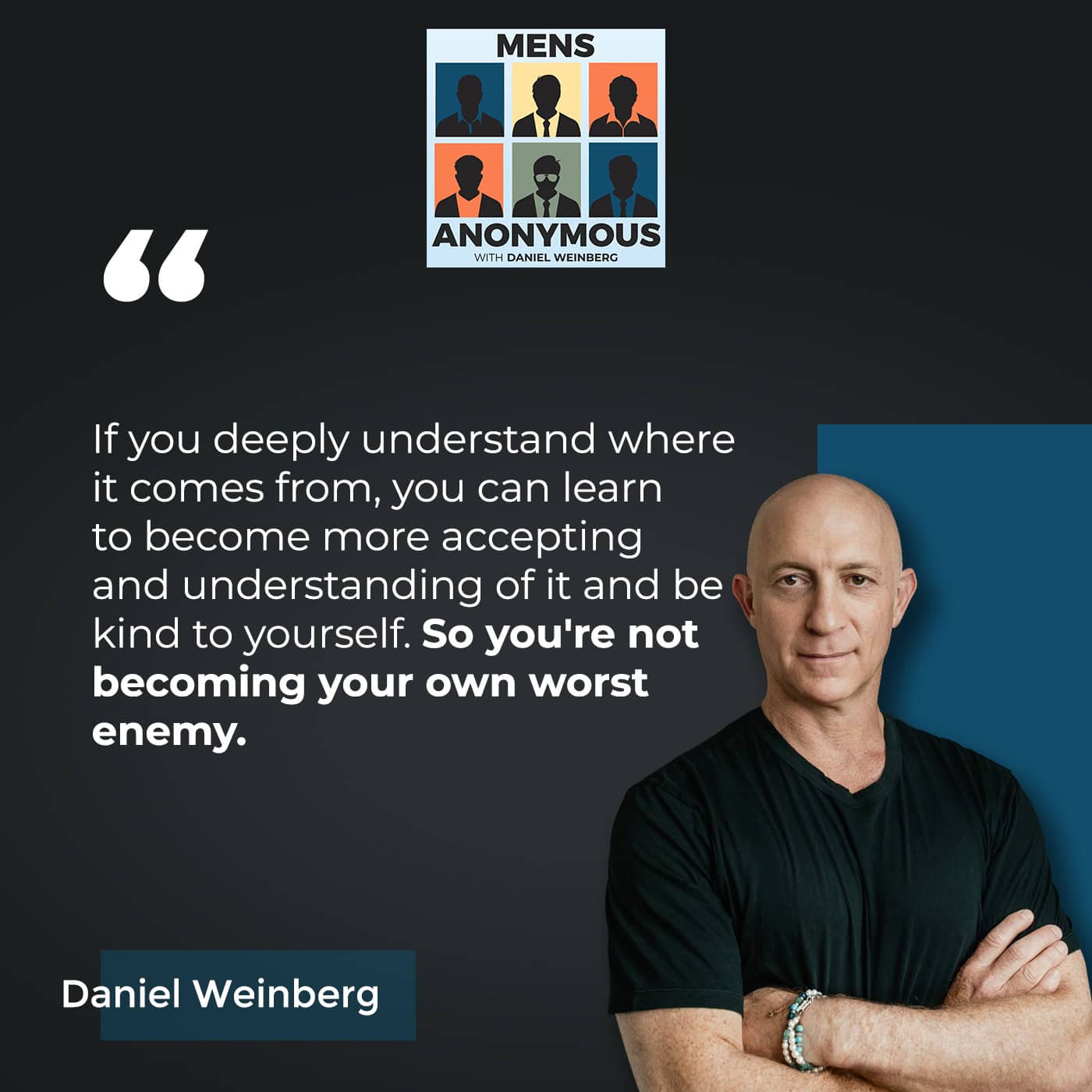
Healing Journey: Therapy, Fitness, & Lifestyle Changes
Probably the lack of stability and the environment when I was a child, just a feeling of being unsafe. A few things happened to me growing up that had an impact on me, which made me feel a little bit unsafe when I was alone. I think unconsciously, you just create these protection mechanisms as you do without even realizing to just not put yourself in that environment again. Hence, when you have generalized anxiety disorder, you’re always on high alert. You’re always looking around, and you’re always checking behind you. It’s very interesting.
I didn’t realize this stuff till after. You’re consistently aware of your surroundings, which, by the way, is a great thing as well. I always say, “If the worst thing that happened to you ended up being the best thing that happened to you.” If it wasn’t for my anxiety, I probably wouldn’t have had the grit, and I probably wouldn’t have had the determination to prove to the world that I can be loved, to prove to the world that I am a good person, that I am good enough.
I think because of some of the trauma that happened to me of not feeling like I’m good enough, it created this unconscious behavior and created grit within me. Once I started to understand a lot of that early trauma or early things that happened to me was what was impacting me as an adult, it doesn’t make it go away, but it does make you more self-aware. You can start to become more conscious of your behavior. If I drank alcohol, my anxiety would always be worse the next couple of days after that. Moderation is key. I gave up alcohol recently for 4 or 5 months. I gave up medication for 4 or 5 months, and I was in a good place, but I found that a couple of beers is okay.
I found that I wasn’t that social, and that was a part I loved. I love being social. Now, I think that moderation was key for me. A second is obviously fitness, getting to the gym, looking after myself, going for a walk. The third was therapy. If you just have a therapy and you still go on the piss every night, you don’t go to the gym and you don’t eat healthy, I don’t think you’re going to get fixed. You’ve got to do a lot of things, and you’ve got to do a lot of things the right way.
It’s a package deal.
Even then, you could be great, and then something could happen, and you just have a bad day or you have a bad week. Healing is not linear. It’s being able to do the work consistently. You can always make the mistake of thinking that you’ve healed, and then the next day, you’re just reminded that you’ve got a lot of work to do.
I want to get into the practices because you keep talking about meditation. You’ve spoken at Harvard to global leaders on meditation. We’ll talk about that because it was a fascinating experience. I want to know how this has impacted your romantic relationships with your wife or ex-wife and just relationships in general. Your romantic relationships and also other friendships, etc. How does it play in there? When you have a partner who doesn’t suffer from what you’re talking about, it may be difficult for them to understand why you behave in certain ways.
My ex-wife and we were together for 22 years. I met her when I was nineteen. She’s my first real girlfriend. I was clubbing. When I was emceeing in the nightclub, she stole the microphone from me. That’s how we met. 22 years, love of my life. We had an amazing relationship. She was just my rock. I think if I’m honest with you, the fact that she understood me, the fact that she could work with me, really supported me and kept me grounded through the process of building this business.
I think it was super important that she was there just to be someone I could speak to. It’s so important you have someone you can talk to. A lot of this time, especially to a woman, having a conversation with a woman with the masculinity around you, you want to try and be tough, and you want to try and be the man, and you shouldn’t show your vulnerability. I think doing that helped me because it allowed her to help me, if that makes sense, versus me trying to suppress it and deal with it on my own.
In terms of the ups and downs in the relationship, I think because of all the work I’ve whether it’s therapy or just inner work, and there’s still so much more I need to do, I started to realize, and I just finished a master’s degree in organizational psychology in Seattle. I did that. What we want to understand is the brain. I learned a lot about myself through that process. The unconscious behavior I did probably didn’t support the relationship with my ex.
A lot of that’s being driven by unconsciously wanting to be seen, wanting to be validated, wanting to be loved. Things like being over-honest, over sharing. Things I probably shouldn’t share because I don’t want to be a bad boy. Have to be a good boy. Just over sharing things, which are not going to support the relationship, it clears my conscience.
Can you give me an example of over-sharing?
Let’s say you’re some mates, bugs party weekend or stag party or bachelor party, any American viewers, and you go to a strip club. It happens in this environment. I may be a girl taps you on the ass because that’s what they do. They get paid to do that. That’s just what happens. You don’t need to share that. Me unconsciously, because of the program I had of having to be a good boy, because when I was young, I felt like I was a bad boy, I would say to my ex, “Babe, I was in a strip club and some bird slapped my ass.”
She’s like, “What you telling me for?” That’s not healthy, but because I was immature and I didn’t do the work, I was projecting my stuff onto her, which I think is not healthy in a relationship. That’s not the reason we got divorced, but I do think that we’ve all got our own shadow work we need to do. Now, I’ve done some of that work. I wouldn’t act that way again because it doesn’t help anybody.
We've all got our own shadow work we need to do. Share on XYou got meditation. It sounds like out of all the practices, it has had the most positive impact on you and changed your life. Can you tell us how you got into it and why it’s been so positive for you?
The Power Of Meditation: A Profound Spiritual Experience & Transformation
My executive coach at the time said, “You need to learn to meditate.” At the time, I’m like, “I cannot sit still for five minutes. That’s no work at meditate.” He said, “Just start small and see how you go.” I started doing it, and then hits like he does an hour a day. I’m like, “An hour a day. That’s insane. I cannot sit still for five minutes.”
Two days ago, I did an hour and twenty minutes. Over the years, I’ve learned to be able to do more. When I started, I couldn’t do more than twenty minutes. I started doing it every day. I was fortunate enough to be introduced to this teaching monk called Monk Burin. I met him in Bangkok. He does a lot of work with Jeffrey Sachs. He’s based in New York and between Bangkok and does a lot with the UN and sustainable development goals.
He’s the monk I flew to Boston from Bangkok to Harvard. I was lucky to spend some time with him, and he taught me the middle way meditation. It’s Buddhist meditation, where they say it comes from the Buddha, and he was under the Bodhi tree. It’s focusing two fingers above your belly button, focusing on that point there in the center of your body and putting your attention there. Very similar to any other meditation, whether you’re listening to music or it’s guided or you focus on your breath, it’s like a tear meditation where they say a mantra. This is just focusing on that point.
Your eyes are closed or open?
Eyes closed.
You focus two fingers above your belly button. You just focus on that.
Put that attention there. The strategy, you come back to that, but I think it can be one point of focus, but that’s what he taught me. The thing that stuck in my mind. I love this. He says, “Every day we wash our bodies. We have a shower, we have a bath and we’re taught that from a very young age, but every day we need to wash our mind.” We need to clean our minds. If you don’t have a shower or you don’t wash your body for a week, you’re going to be stinky. You’re going to get dirty. It’s the same for your mind.
If your parents were to teach kids to meditate every day, then they would meditate as an adult. Your parents don’t tell me now, “Richard have a shower.” You just do it. I loved that. It becomes a habit. He said, “Do it every day for 30 minutes and see how you go.” I did it every day for 30 minutes. I had this like pretty profound thing that happened. I wasn’t very spiritual before this. I was probably agnostic, and I found experience in meditation. I was like, “This is unbelievable.” I spoke to my teaching monk, and he’s like, “Richard, just calm down. Just observe. Remember, you observe.”
Let’s focus on this for a second. Firstly, how does it make you feel after doing meditation for a prolonged period of time? Once you do the practice, I’ve done meditation at different points in my life. I tend to do them when you’re like, “We’re having a tough time. I’m going to do this for a while and just get me to a peaceful state.” I do other things that get me to a peaceful state, meditative, but like the actual practice of meditation. They say that you need to do it for a period of time. You start feeling the effects of it. Talk us through, there’s like that spiritual moment.
There’s a recent study by Sara Lazar from Harvard Medical School. They studied a group of 60 men. They had the meditator every day for 30 minutes for six weeks. After six weeks, they’d recheck the MRI scan, and the actual amygdala in their brain is so shared with flight or flight shrunk in size. This stuff works. Some studies show that regular meditators, their brain doesn’t shrink as they age.
As we age, our brains naturally shrink. When they’ve tested long-term meditators, their brain hasn’t. There’s a lot of scientific research by and for me was, I don’t want to be too woo-woo, but I was meditating for twenty minutes. It was about 20 minutes into a 30-minute meditation. All of a sudden, I thought somebody shone a bright torch in my eyes. I thought somebody opened up the window or the blinds or the in the temple and that’s the light come in. It freaked me out. It went completely white.
It felt like someone dropped a pebble in my stomach and this vibration, like this feeling of vibration. I opened my eyes, and it was pitch black. I just freaked out when you can see me saying, my hairs are sticking out. I spoke to the monk. It’s like, “That’s great. That means you’re moving through the right processes. You’re going into the right state of mind. You’re disconnecting from the thoughts. You’re disassociating yourself with the body.” I’m like, “Wow.” That’s probably happened three times in six years. It doesn’t happen a lot, but when it happens, I’m like, “There’s much more to this than meets the eye.”
Insane. Talk us through the experience of speaking. I think it was like 200 global CEOs from around the world at Harvard. You spoke to them about your journey and the benefits of meditation, and you took them through a meditation. Is that correct?
Yeah, correct.
Talk us through how you got there and how that all happened.
I’m part of a network called the YPO, which I know you are, Dan. I hope you don’t mind me showing that, but that’s where we met a few years ago. I go there every year and one of the best years I had. There were a couple of professors talking about vulnerable stories. I spoke to the program coordinator, and I said, “Listen, this has been taken rid of. We need more people to speak about vulnerability.
The guy had a pretty traumatic childhood. I’m happy to share my story about my trauma, but also how I deal with anxiety as a CEO. Many CEOs have anxiety and depression, but they don’t talk about. I think we should share and start to speak about this.” She loved the idea. We planned it maybe a year out. I then spoke to the Van Buuren and said, “Would you like to come to Harvard?” They were blown away.
They’d love to get in front of Harvard. He even said to me. They want the whole world to meditate, and their whole theory is world peace through inner peace. His dream is to get the UN German assembly to meditate. That’s what he’s working to try and do before they have a meeting. I think he’s dreaming, but it would be lovely if he could do that. I’d love it to happen. When I said he could get to Harvard, he was very excited. He flew up. I did my speech to the CEOs at the business school. We did a 20-minute meditation where he taught them the middle way meditation.
I think that this was done when I realized this was my purpose. This was my calling. It was probably 7 or 8 years ago now. I’ve been doing the work for a while, but it was profound. How it impacted these people, like grown men coming up to me saying they finally felt seen. Grown men saying, “I’ve never ever had anyone to share this with. You don’t understand. I don’t feel like I’m alone anymore.” That, for me, was just huge. That set me on this path. I still do my FinTech stuff in Stanisha, but really on this path into step into courage, this movement I’ve started.
That’s a good segue. You’ve created this platform called Stepping Into Courage. Why don’t you talk to us a little bit about what the platform is?
Stepping Into Courage: Creating A Men’s Community For Vulnerability & Support
It’s called Step Into Courage, and it’s really just the beginning of something that I’m hoping to grow over the next few years. It’s not something I’m investing all of my time in because I’ve got my business, but the idea is I want it to organically grow. It’s really the idea is to inspire men to share vulnerable stories. To share stories about themselves that they wouldn’t normally share. We’ve created a men’s group. There’s a members’ club here in Singapore, a bit like a solo house. It’s called 1880.
I’ve got 40 men that meet in groups of 7 or 8 every month. They meet and have a forum, and they talk about business, personal, and family. I create a structure around non-judgment, and you can only talk from experience. It’s giving men an opportunity to talk from their heart. It’s not a boys club, and no alcohol is involved. It’s sitting there. You can go for drinks after, but they have to be present, and they have to be prepared to go deep and do the work.
How long is the session every month? Is it three hours?
It’s 2 1/2 hours to 3 hours. We do a thing called MEPS. How are you fitting Mentally, Emotionally, Physically, Spiritually. They’ll all give like a five-minute update on their last month. We’ll see if anybody has anything they want to present to the group. It doesn’t get biased, it’s shared experiences from the rest of the members.
I’ve come across a lot of similar-type movements/programs that are happening all over the world now, which is fascinating because you’re all doing something very similar. What I always like to ask is, can you give me maybe some anecdotal feedback or like an anecdotal story on how this is impacting the men that are participating in these groups? A lot of them have never done this before. It’s their first go at it. It’s a big jump from not making yourself vulnerable to exposing yourself to things you’ve been carrying or suppressing for, obviously, a lifetime. Suddenly, they’re talking to another seven strangers with whom they are now forming deeper bonds because they’re just revealing things that they’ve never revealed before.
Hence, why step into courage because it is a courageous thing to do. I think vulnerability is an act of power. I think it shouldn’t be seen as a weakness, and certainly, my older generations like my father and my grandparents, this would be seen as a weakness, unfortunately. If I come over to Asia, which is so far behind in Asia than it is in the Western world around dealing with mental health and talking and being vulnerable. I won’t share on behalf of some of the other sisters, but I can share on my own behalf. I think once you start to open up, it’s amazing. If someone opens up to you, I think it’s like quite tribal. It’s like summer shares.

You’re basically giving them an invitation to open up reciprocity. They now feel like, “I feel safe because now you’ve shown me you’ve shown me yours. Now I’ve got to show you mine.” A little bit like that. Before you were doing these groups, and outside of let’s say YPO amongst your, your friends, your tribe, I’m sure today it’s a little bit different, how were you in that process of when you were going through the suffering with the anxiety and all the stuff you were dealing with? How much did you share with your friends?
I didn’t. That’s the problem. Imagine being the CEO of a financial company of a hundred traders on the floor, men, brokers, pinstripe suits. You don’t. Hence, why I burn out. Hence, why I got shingles. My Angie and my ex, who was amazing for me, need more than that. We need a tribe. We need a group of men who are there for us. All women, but we just need people around us that can support us.
I think that was only when I did the work with my executive coach, and he spoke to me in one of our first sessions and he said, “Richard, one day you will share your story.” I was like, “There is no way I’m sharing this story. This is so personal.” He said, “Richard, one day when you’ve done the work and you’re brave enough, because you can help others.” Cut to five years later, I’m standing on Harvard. He was right.
I think it’s having the confidence to step into your courage and start to share. It doesn’t seem as alien. On the flip side, Dan, you’ve got to share with the right people. You’ve got to share in the right environment. As an example, I was with a friend of mine who’s very open, and we were having dinner maybe three years ago.
At the dinner table, there was an older gentleman at the table who’s from an older generation, and I was chatting with my friend, and I’m like, “Mate, we’ve got so many great memories. You know I love you, buddy.” That moment was nice. The older gentleman said, “Guys, calm down. What environment are we talking about now? Is this a gay party?” Do you see what I mean? You’ve got to choose and no judgment on that person. I think it’s very important that you find your tribe where you can be vulnerable without being shut down.
It's very important to find your tribe where you can be vulnerable without being shut down. Share on XRichard’s Personal Insights: Apologies, Pride, And Kindness
Richard, thank you so much for your time. There’s so much to unpack there and such important work you’re doing. As I finish up the show, I like to ask my guests five quick questions. If you will entertain me, who would you like to say sorry to given the chance?
When I got there, I struggled because I was going to give a cliche answer, but I think it’s true. Probably myself. I think that with the work I’ve done with therapists, I forgot about the little Richie inside of me, that little boy. It’s him forgiving me for abandoning him. That makes sense. When I do a lot of inner child work, it’s like, “I’m here for you. I’m sorry, I you go. I’m here to protect you now. I’m here to make sure you’re going to be okay.” If you let the little boy drive the bus, you start making bad decisions, in my experience.
It’s so interesting. You do talk about the inner boy because it’s something we don’t talk about, but the reality is we all still have that little boy inside of us no matter how old you get. What are you proud of being or doing in your life?
Probably one of the things I’m proud of is when we sold the company. I didn’t own the company, but I did quite well at the transaction. I did a Zoom call, and I paid my sister’s mortgage off. I sent my mom and dad some money. I looked after my niece, I looked after my ex’s family. Just being able to give back, coming from a very working class, I’m proud that I was able to do that. Also, I’m proud of the work I’m doing now, the Step Into Courage stuff and the public speaking, because I mean, look, I’ve got 500 followers on Instagram. It’s not huge. I don’t care if it can affect one person. That’s what I care about is having an impact on people.
When did you receive kindness while needing it most and expecting at least?
Probably a few months ago, I had a bit of a nightmare. My anxiety got pretty bad because my nan passed away. A few things happened. I could deal with it, but I just wasn’t my best self. I found that I was pretty much not being as social. It never really impacts my work, believe it or not. It just impacts me after work. I can seem to switch over work. It impacted me socially. People could tell.
Everyone come out of the woodwork, including yourself, Daniel, people that come out of the woodwork and just text. I wake up to maybe fifteen texts, “Thinking of you buddy, how are you?” Just people that you wouldn’t normally expect. Again, shines a torch on people to understand what it’s like to feel alone. People want you to know that you’re not alone. There were many people that were there for me, and I didn’t feel like I deserved it, but I just didn’t expect it.
I could sense that when we were communicating, and I’ve been there before. It was really important for me, just for you to know that if you want to talk, you’ve got someone there to talk to. Just that alone is enough of, “There’s someone who’s there who sees me and who’s there for me.” It’s hard, and I could see you were really, like, let’s say, crawling through the mud.
I think it’s the lack of communication. I was replying in short messages. It wasn’t organizing a time for a catch-up. You could read between the lines that there was something that wasn’t right.
Of course. When I was going through it, you’re also hiding. You’re a little bit ashamed. You don’t feel good about yourself, and you don’t want to put that on others. You don’t want to, you don’t want to have that, you don’t want to show it. You also don’t want to have that energy with people. You don’t want people to feel sorry for you. What did your mother or father teach you that you frequently remind yourself of?
Growing up in the UK in the ‘80s and ‘90s, it’s just resilience. I think both my parents had very difficult upbringings themselves. They had to go through a lot growing up. They did the best that they could. I also know that my dad is just always like, “It’s only money, son,” things like that. “Don’t worry, boy, you’ll be all right.” Always look on the bright side of things. Just that optimism. My mum as well. After what they’ve been through, it’s pretty amazing that they can always be so optimistic. I find that quite inspiring just to always look on the bright side of things and be optimistic.
The final one, which I’m very curious about. What’s your superpower?
Superpower Revealed: Disarming People & Fostering Vulnerability
Probably disarming people. I’ve got a very natural ability of making people feel safe and comfortable around me. I don’t know if it’s something you can be taught. I honestly don’t. You’re either born with it, or you’re not born with it. I’m lucky I was born with it, and it’s my vulnerability. Maybe it’s being comfortable to open up. I think probably that helping people come out of their shells and be their true authentic selves.
Richie Poulton, thank you. I wish you lots of luck, just lots of positive energy going your way for what you’re doing with stepping into courage. You’re obviously having quite an impact. Also quite a scalable model. You could roll that out all over Asia. You have it in Singapore now, but I’m sure you could roll it out into many other different countries. You’re doing great work. As always, it was a pleasure to spend some time with you.
You too, Dan.
Important Links
About Richard Poulton
 Richard Poulton, former Asia Pacific CEO at AFEX, is a self-made leader whose career trajectory defies conventional paths, moving from humble beginnings in London to global success in the foreign exchange market. Without a degree, he leveraged charisma and relentless drive, climbing from sales floors to executive roles across four continents, culminating in a nine-figure acquisition of AFEX. Beyond professional achievements, Richard’s journey includes profound personal transformation, driven by a diagnosis of shingles that catalyzed a deep dive into self-discovery through meditation and mindfulness. This focus on inner growth now fuels his work as Founder and CEO of Instantia, providing intelligent risk management, and as a speaker sharing his experiences at institutions like Harvard and the UN, emphasizing courage and authenticity. His recent completion of an Executive Master’s at INSEAD and ongoing studies at Harvard underscore his commitment to continuous learning and empowering others.
Richard Poulton, former Asia Pacific CEO at AFEX, is a self-made leader whose career trajectory defies conventional paths, moving from humble beginnings in London to global success in the foreign exchange market. Without a degree, he leveraged charisma and relentless drive, climbing from sales floors to executive roles across four continents, culminating in a nine-figure acquisition of AFEX. Beyond professional achievements, Richard’s journey includes profound personal transformation, driven by a diagnosis of shingles that catalyzed a deep dive into self-discovery through meditation and mindfulness. This focus on inner growth now fuels his work as Founder and CEO of Instantia, providing intelligent risk management, and as a speaker sharing his experiences at institutions like Harvard and the UN, emphasizing courage and authenticity. His recent completion of an Executive Master’s at INSEAD and ongoing studies at Harvard underscore his commitment to continuous learning and empowering others.

